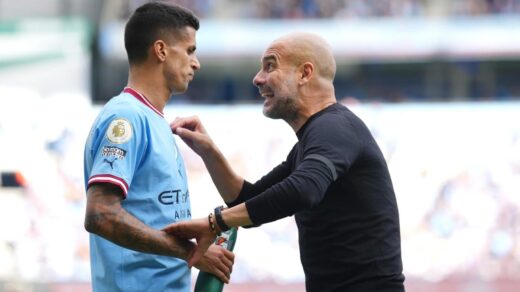Footballers often say their bodies tell them when it’s time to retire, but former Arsenal and Manchester United players are among a select group whose bodies were wrong.
In a game in which pace and power have become increasingly important, it’s becoming harder and harder for players to continue competing at the top level heading into their mid-30s.
Some legends of the game have gone on a fair bit longer, however – and this lot hung up their boots only to realise they have still got it, after all.
Paul Scholes
On January 8, 2012, more than six months after announcing his retirement, Scholes was named on the bench for the Manchester derby.
Not even his team-mates knew he was returning before they got into the dressing room that day, never mind the shocked United fans – and media – inside the stadium.
Scholes ended up making 21 appearances in the second half of the season and then stayed on for another year as United won back the Premier League title before Sir Alex Ferguson and Scholes – for good this time – called it a day.
MUST WATCH: Paul Scholes honest, disarmed, reflective…fascinating. The story of how one of our greats made his comeback…enjoy. pic.twitter.com/Tp7GElsPss
— Jake Humphrey (@mrjakehumphrey) February 17, 2018
Jens Lehmann
Having left Arsenal in 2008, Lehmann called it a day in 2010 but returned a year later when three of Arsene Wenger’s goalkeepers were out injured.
Lehmann put aside his feud with Manuel Almunia to sign as back-up, but after the Spaniard was injured in the warm-up ahead of a clash with Blackpool, the 42-year-old stepped in and played his part in a 3-1 win.
Johan Cruyff
Following his initial retirement in 1978, Cruyff cited financial reasons for his prompt return to football with Los Angeles Aztecs, having reportedly been scammed in Spain with false investments.
“I had lost millions in pig farming and that was the reason I decided to become a footballer again,” he said at the time, going on to play for six further years, including a successful return to Holland with boyhood club Ajax and Feyenoord.

READ: Remembering Johan Cruyff’s brilliant but bizarre American Dream
Robbie Rogers
Having been released by Leeds aged 25, Rogers chose to retire from the game, and in doing so came out as gay.
Stating he felt like a coward for not “stepping up to the plate”, he signed for LA Galaxy just a few months later and became the first openly gay athlete to play in a top American professional sports league.
Now retired permanently due to persistent injuries, his story might be an important one in years to come.
Arjen Robben
Robben enjoyed an illustrious career at PSV, Chelsea, Real Madrid and Bayern Munich but announced his retirement in 2019 after citing the toll injuries had taken on him.
But the winger seemed to regret his decision, and he is going to attempt a playing comeback with his boyhood club FC Groningen in 2020-21.
“I was 12 when I started playing in FC Groningen’s youth academy,” he said in a video posted on Groningen’s Twitter account.
“I made my home debut against Feyenoord when I was 16. After two years I made a transfer to PSV Eindhoven. After a wonderful adventure of 18 years, we’re coming home.”
—December 3, 2000: Arjen Robben makes his professional debut for FC Groningen.
—June 27, 2020: Arjen Robben comes out of retirement to sign for FC Groningen.Back to where it all began 💚 pic.twitter.com/drauzSujIv
— FOX Soccer (@FOXSoccer) June 27, 2020
Stephen Carr
After being released by Newcastle at the end of the season, Carr chose to hang up his boots in 2008 as he couldn’t find a club.
He did promptly return, however, signing for Birmingham in 2009. Twelve years after winning the League Cup with Tottenham, Carr captained the Blues to glory with a famous victory over Arsenal.
Roger Milla
If Milla had his way, nobody would ever have witnessed that famous corner flag wiggle, as the Cameroon striker attempted to retire a year before his heroics at Italia ’90.
Bringing his playing career to an end in 1989, Milla moved to the Indian Ocean island of Reunion but was called back for duty by Cameroon’s president Paul Biya.
Not content with the one World Cup, the forward carried on playing until the next, and at the age of 42 he was the oldest player to appear in the competition until his record was broken by Faryd Mondragon in 2014.
Carlos Roa
Roa, who Michael Owen scored *that* goal against in the 1998 World Cup, retired the following summer to take a religious retreat, despite reaching the final of the Copa Del Rey and Cup Winners’ Cup and winning the Spanish Supercup.
The Argentine refused to discuss a new contract at Mallorca because he believed the world was going to end. When it didn’t, he sheepishly returned to play out his contract.

READ: Michael Owen: The goal I scored against Argentina changed my life
Marc Overmars
Four years after retiring due to a persistent knee injury, Overmars featured in Jaap Stam’s testimonial match and put in a performance which saw a host of clubs offer to sign him.
Having initially declined, the tricky forward re-signed for his first club, Go Ahead Eagles.
Landon Donovan
MLS’ all-time top scorer retired in 2014 but was asked to return in 2016 while working as a pundit on a game which saw three first-team players go off injured.
He couldn’t help them to yet another MLS title though, and the two-time Everton loanee retired once more at the end of the season.
READ NEXT: 12 legends who moved to England too late: Schweinsteiger, Gullit, Larsson…
TRY A QUIZ: Can you name the top Premier League goalscorer for every nationality?



